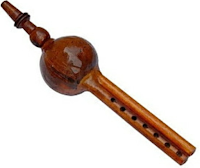I. Evelyn Glennie Listens to Sound without
Hearing It
I. Q.1. How old was Evelyn when she
went to the Royal Academy of Music?
Ans:
Evelyn was 16 years old when she went to the Royal Academy of Music.
Q.2. When was her deafness first
noticed? When was it confirmed?
Ans: Evelyn’s deafness was first noticed when she
was 8 years old. It was confirmed when she was 11 years old.
II. Q.1. Who helped her to continue
with music? What did he do and say?
Ans:
Ron Forbes helped Evelyn to continue with music. Ron Forbes spotted her
potential and said, “Don’t listen through your ears and try to listen in some
other way.
Q.2. Name the various places and
causes for which Evelyn performs.
Ans: Evelyn performed at prison and hospitals.
Evelyn made music her life. Through music, she wanted to spread the message of
love and peace to prisoners and handicapped.
III. Q.1. How did Evelyn hear music?
Ans: Evelyn used to hear music through different parts of her body. In fact, she just felt the music. She tried to feel the vibrations that create sound. When playing drums she used to her upper and lower body to feel vibrations from different types of drums. When playing xylophone she felt the music pulsating through her fingers. When she had to perform on a wooden platform, she used to remove her shoes so that the vibrations pass through her bare feet. She even felt the music through her hair.
Ans: Evelyn used to hear music through different parts of her body. In fact, she just felt the music. She tried to feel the vibrations that create sound. When playing drums she used to her upper and lower body to feel vibrations from different types of drums. When playing xylophone she felt the music pulsating through her fingers. When she had to perform on a wooden platform, she used to remove her shoes so that the vibrations pass through her bare feet. She even felt the music through her hair.
II. The Shehnai of Bismillah Khan
IV. Q.1. Why did Aurangzeb ban the
playing of the pungi?
Ans:
The pungi had a shrill unpleasant sound. Due to its irritating quality,
Aurangzeb banned the playing of the pungi.
Q.2. How is a shehnai different from
a pungi?
Ans:
Shehnai is the refined version of pungi. A Shehnai is a pipe with a naturally
hollow that is longer and broader than a pungi. A Shehnai has seven holes on
the body of the pipe like a flute.
Q.3. Where was the shehnai played
traditionally? How did Bismillah Khan change this?
Ans: Traditionally the Shehnai was played only in
temples and weddings. Bismillah Khan invented ragas which were earlier
considered to be beyond the range of the Shehnai. He brought this into
classical music mainstream and changed the way people perceived shehnai.
Q.4. When and how did Bismillah
Khan get his big break?
Ans:
In 1938, when All India Radio opened in Lucknow, Bismillah Khan got his big
break.
Q.5. Where did Bismillah Khan play
the shehnai on 15 August 1947? Why was the event historic?
Ans:
On 15th August 1947, Bismillah Khan played shehnai at the Red Fort in Delhi.
The event was historic because on that day India received independence.
Q.6. Why did Bismillah Khan refuse to
start a shehnai school in the U.S.A.?
Ans: Whenever Bismillah Khan was out of Benaras, he
only used to think about only Benaras. Because he was in love with Benares and
the Ganges flowing there. He used to get inspiration from the atmosphere of
Ganges ghats in Benares. There was not a suitable atmosphere to play the
Shehnai in the USA. So, he refused to start a shehnai school in the USA.
Extra
Questions & Answers
Q.1. Who was Ustad Bismillah Khan?
Ans: Ustad
Bismillah Khan was the famous shehnai player.
Q.2. What do people call Bismillah
Khan fondly?
Ans: People
call Bismillah Khan fondly as Khansab.
Q.3. When and where was Bismillah
Khan born?
Ans: Bismillah
Khan was born on 21 March 1916 in Dumraon in Bihar.
Q.4. What was the father's name of
Bismillah Khan?
Ans: The
father's name was Paigambar Bux.
Q.5. Who was Ali Bux and what did
he do?
Ans: Ali
Bux was Bismillah Khan’s maternal uncle. He was a professional musician and was
employed to play the Shehnai.
Q.6. Who was Rasool Bux Khan?
Ans: Rasool
Bux Khan was the Shehnai-Nawaz of the Bhojpuri King’s Court. He was Bismillah
Khan’s grandfather.
Q.7. What was the name of Bismillah
Khan’s grandfather?
Ans: The
name of Bismillah Khan’s grandfather was Rasool Bux Khan.
Q.8. When was Bismillah Khan
awarded India’s highest civilian award, the Bharat Ratna?
Ans: In
2001, Bismillah Khan was awarded India’s highest civilian award, the Bharat
Ratna.
Q.9. Which were the most wonderful
towns of the world for Bismillah Khan?
Ans: Benaras
and Dumraon were the most wonderful towns of the world for Bismillah Khan.
Q.10. What honours were conferred
on Bismillah Khan?
Ans: National
awards like the Padmashri, the Padma Bhushan, the Padma Vibhushan and the
Bharat Ratna were conferred on Bismillah Khan.
Q.11. To which foreign country did
Bismillah Khan go on his first trip?
Ans: His first trip abroad was to Afghanistan.More Solutions ---
Prose
---
·
My Childhood
·
The Bond of Love
· A visit to Kaziranga and Sivasagar
Poem
---
·
A Legend of the
Northland










0 Comments
Please do not enter any spam link in the comment box.